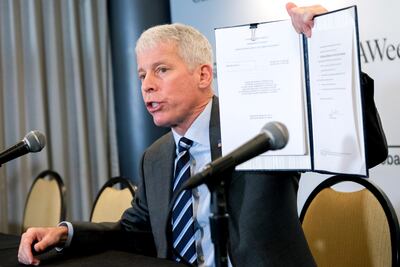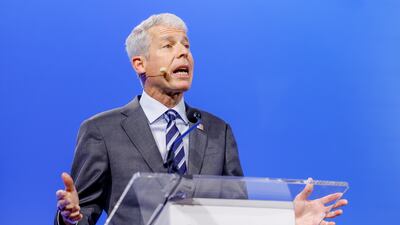Newly confirmed US Energy Secretary Chris Wright on Monday said that President Donald Trump's administration wants to increase natural gas production, in a stark change from the previous White House.
“We are unabashedly pursuing a policy of more American energy production and infrastructure, not less,” Mr Wright said during an address at the CeraWeek by S&P Global energy conference in Houston, Texas.
CeraWeek is the first major international energy conference to be held since Mr Trump began his second presidential term. He made a series of moves to reverse predecessor Joe Biden's policies, including withdrawing from the Paris Climate Accord and lifting a pause on permits for liquefied natural gas (LNG) projects.
The US President also used a high-profile online address in Davos this year to call on Opec member countries to boost their production. Then in early March, the global group announced it plans to increase its oil production in April for the first time since 2022.
Mr Wright announced that he had approved an LNG export permit for the Delfin offshore Louisiana LNG export terminal. Mr Biden paused approvals for LNG exports due to concerns over fossil fuels' effects on climate change.

Calling himself a “climate realist”, Mr Wright criticised Mr Biden's climate policies as “irrational” and “quasi-religious”.
“The Trump administration will treat climate change for what it is, a global physical phenomenon that is a side-effect of building the modern world,” he said.
Mr Trump chose Mr Wright and Interior Secretary Doug Burgum to help increase domestic oil and gas production. Mr Burgum was due to address the conference later this week.
However, Carlyle Group's Jeff Currie expects trade in fossil fuels to decline as countries push to invest in renewable and nuclear power. Mr Currie said the vulnerability in fossil fuels' transport will lead countries to reduce their oil and gas imports.
Mr Wright said the Trump administration envisions a so-called American nuclear renaissance, adding that artificial intelligence will help drive next-generation fission and fusion nuclear energy.
But with demand for energy in the US increasing because of the massive amounts required for AI, Mr Wright said regulatory changes and private capital are needed to help support it.
“The more energy investment, the more intelligence produced,” he said. “Since the demand for energy is unlimited, since the demand for intelligence is unlimited, so will be the demand for energy.”


